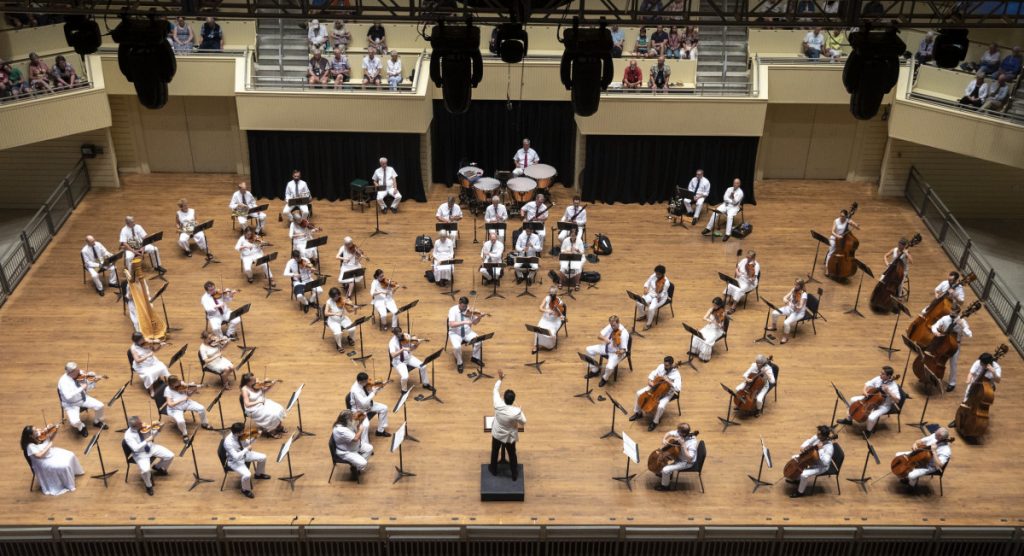ZACHARY LEWIS – GUEST CRITIC

At first glance, there might not have seemed anything terribly remarkable about the Chautauqua Symphony Orchestra’s program Wednesday night at the Amphitheater. Just another evening of Beethoven and Dvořák.
But looks, especially glancing ones, can be deceiving. With acclaimed conductor Cristian Măcelaru, music director of the Orchestre National de France, on the podium, the staid slate of two great composers was anything but dull. Indeed, in some ways, it was revelatory.
Perhaps most rewarding were the lines of connection drawn between two titans of classical music. That Beethoven influenced Dvořák is well known. Wednesday, though, proof of that lineage was laid uncommonly plain, in a manner all could hear.
Why Dvořák’s “Legends” aren’t played more often, and in fact received their premieres at Chautauqua Wednesday, is something of a mystery. The seven pieces (the original cycle consists of 10 pieces for piano duo) Măcelaru presented – Nos. 1-5, 8 and 10 – were veritable gems, brief scenes teeming with melody, drama and regal flair. Each one could have been the seed for a symphony or some other, much longer work.
At least they received the treatment they deserve. Măcelaru and the CSO, bound by a clear chemistry, identified the essence of each piece and then set about relaying it with exquisite grace and flexibility. The strings rose brilliantly to every diverse occasion and the horns repeatedly proved a golden, harmonious force.
But the genius of the evening rested in those ties to Beethoven. Throughout the Dvořák, one couldn’t help but hear similarities and even echoes of the older master, as if the one had been somehow on the mind of the other. Even had the program ended there, the link would have been edifying.
But the program did not end there, of course. As if to balance the equation, Măcelaru also programmed Beethoven’s Symphony No. 7, a work that for many represents the pinnacle of the canon and unarguably contains some of the composer’s most characteristic pages.
The performance itself was a joy. A vivid but not overbearing presence, Măcelaru coaxed from the CSO a reading that skewed exciting but never veered radical or strayed far from tradition. Here was a conductor who insisted on shapely phrasing, demanded crisp enunciation, and took matters of dynamics seriously.
He may have been guilty, in the fourth movement, of pushing the pace beyond the articulate limit, but everywhere else, his choices struck this listener as not only reasonable but spot-on. The zeal of the orchestra in the first movement was palpable, not to mention infectious, and the account it gave of the famous Allegretto second movement was as propulsive, sleek and profound as any in recent memory, thanks in no small part to the CSO’s stellar winds.
It’s telling that in addition to leading orchestras in Europe, Măcelaru also presides over the Cabrillo Festival, a leading celebration of contemporary music. Not every conductor is comfortable in such different realms. Judging by his performance Wednesday, however, Măcelaru is a musical bridge-builder, and clearly knows how to make any venue and any repertoire feel like home.
Zachary Lewis is a freelance journalist in Cleveland. He is the former classical music and dance critic of The Plain Dealer.




